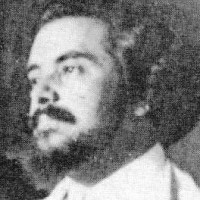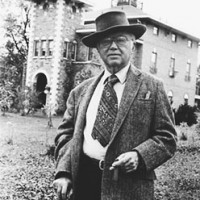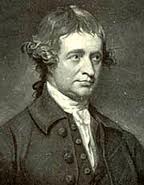Remembering an Eastern Orthodox Prophet: Nicholas Berdyaev, by Bradley J. Birzer
One kind of weird but enticing academic puzzle for me is discovering and delving into the works of interesting figures of the 20th century who have been largely forgotten. And, by “interesting figures,” I mean especially those who espoused types of religious humanism and their allies.
TIC mastermind Winston Elliott feels the same way, and one of the purposes of founding TIC was to bring the memory of these humanists back to the public and honor each as a vital ancestor to our own broad cause in the twenty-first century.
Everyone remembers, for example, G.K. Chesterton, T.S. Eliot, C.S. Lewis, J.R.R. Tolkien, and, more recently, Flannery O’Connor and Walker Percy. Even if one hasn’t read any of their respective works, their names circulate with familiarity even in the darker corners of American civilization.
At a different, slightly lower level hover Irving Babbitt, Hilaire Belloc, Paul Elmer More, Willa Cather, Christopher Dawson, Jacques Maritain, Etienne Gilson, Josef Pieper, Walter Miller, Alexandr Solzhenitsyn, and Russell Kirk.
But only a very few remember eccentrics such as T.E. Hulme, Aurel Kolnai, Leo Ward, Sister Madeleva Wolff, Wilhelm Roepke, Romano Guardini, Gabriel Marcel, Owen Barfield, Theodore Haecker, David Jones, Tom Burns, and Bernard Wall.
Nicholas Berdyaev (1874-1948), a member of this last group, has been sadly neglected as well, at least by those in conservative and libertarian circles.
He was, not surprisingly, connected to many Christian Humanists of his day. He knew the Maritains well, and while C.S. Lewis mostly dismissed his work as a sideline show, Christopher Dawson considered Berdyaev’s thought central to the restoration of the 20th-century West.
The trump card, here, though is from a fellow Russian. A figure no less important or heroic than Alexandr Solzhenitsyn discussed Berdyaev briefly in volumes II and III of The Gulag. He was, Solzhenitsyn wrote, offering perhaps the highest praise possible, “a man.”
In volume II, he described Berdyaev as the ultimate person to reject Soviet terror.
So what is the answer? How can you stand your ground when you are weak and sensitive to pain, when people you love are still alive, when you are unprepared? What do you need to make you stronger than the interrogator and the whole trap? From the moment you go to prison you must put your cozy past firmly behind you. As the very threshold, you must say to your self: ‘My life is over, a little early to be sure, but there’s nothing to be done about it. I shall never return to freedom. I am condemned to die–now or a little later. But later on, in truth, it will be even harder, and so the sooner the better. I no longer have any property whatsoever. For me those I love have died, and for them I have died. From today on, my body is useless and alien to me. Only my spirit and my conscience remain precious and important to me.’ Confronted by such a prisoner, the interrogation will tremble. Only the man who has renounced everything can win that victory. But how can one turn one’s body to stone? Well, they managed to turn some individuals from the Berdyayev [sic] circle into puppets for a trial, but they didn’t succeed with Berdyayev. They wanted to drag him into an open trial; they arrested him twice; and (in 1922) he was subjected to a a night interrogation by Dzerzhinsky himself. Kamenev was there too (which means that he, too, was not averse to using the Cheka in ideological conflict). But Berdyayev did not humiliate himself. He did not beg or plead. He set forth firmly those religious and moral principles which had led him to refuse to accepted the political authority established in Russia. And not only did they come to the conclusion that he would be useless for a trial, but they liberated him. A human being has a point of view!”
In volume 3 of The Gulag, Solzhenitsyn wrote simply: Berdyaev was a “philosopher, essayist, brilliant defender of human freedom against ideology.”
Exiled from Russia in 1922 after surviving three Soviet trials against him, Berdyaev settled in Paris, living there until his death in 1948.
While in Paris, Berdyaev became an integral part of the Jacques and Raissa Maritain circle. Indeed, as Berdyaev remembers it in his fine autobiography, Dream and Reality, he and Jacques served as equal poles in the creation and perpetuation of the group. Though Maritain’s extreme Thomism struck Berdyaev as a form of Catholic ideology, he respected the French philosopher immensely. He did joke, however, that Maritain’s fear and rejection of Protestantism and Protestants was a strange element of the convert, implying a certain irrationality.
When Christopher Dawson and Tom Burns first formed the Order group in Chelsea, London, employing the resources of the publishing house Sheed and Ward to unify all humanists of British and Europe backgrounds, Dawson immediately sought out Maritain and Berdyaev. Each contributed to one of the best book series of the last century, the 16 volume Essays in Order. As it turned out, Essays in Order served as the one attempt in the twentieth century to bring all Christian Humanists together into a unified Republic of Letters.
When Essays in Order folded, Dawson continued the same project with a second friend, Bernard Wall, publishing a journal, Colosseum. Again, Dawson and Wall sought out and received the contributions and acclaim of Berdyaev and Maritain.
One of Berdyaev’s most interesting books–and presumably the reason Dawson thought so highly him–was his The End of Our Time, written between 1919 and 1923 and published for the first time in English in 1933 by Sheed and Ward. In almost every way, though clearly a Russian and a member of the Eastern Orthodox faith, Berdyaev anticipated the major arguments of the English-Welsh Roman Catholic Dawson.
In particular, Berdyaev stressed the primacy of culture and theological issues over politics and economics as truer forms of reality. Almost the entire western world, Berdyaev argued, had embraced some form of materialism after the collapse of Christendom. And, this moved the world rapidly toward unreality.
“We must begin to make our Christianity effectively real,” Berdyaev wrote, “by a return to the life of the spirit.” Economic matters, he continued, “must be subordinated to that which is spiritual, [and] politics must be again confined confined within their proper limits.”
read the complete article in The Imaginative Conservative
Edmund Burke on Manners, by Ian Crowe
It took Edmund Burke a very little time to decide that French Revolutionary philosophy posed a massive threat to civilization and social stability throughout Europe. By the end of his life, eight years after the storming of the Bastille, his fears of Jacobin contagion had led him to ask for a secret grave, removed from his family sepulchre and hidden from those-the English Jacobins-who would plunder the lead from tombs for bullets to assassinate the living. In 1796 he wrote: “…out of the tomb of the murdered monarchy in France has arisen a vast, tremendous, unformed spectre, in a far more terrific guise than any which ever yet have overpowered the imagination, and subdued the fortitude of man.” He demanded nothing short of a war of extermination against this “armed doctrine.”
It is somewhat surprising, then, to find that this enormous threat brought out Burke’s most urgent defense of an aspect of civilization as trivial as “manners.” Of course, the very fact that we consider manners “trivial” was all part of the problem from the start, as far as Burke was concerned, and he felt driven to state his case unambiguously in his First Letter on a Regicide Peace (1796):“Manners are of more importance than laws. Upon them, in a great measure, the laws depend.” How can this apparent inversion of common sense be justified?
Manners are clearly not the same as laws. They are generally unwritten (unless we are talking about ritual), and they lack the regular, codified sanctions that support institutes and decrees. However, they have a similar function: in our small social communities and informal relationships they lay down expectations of behavior that facilitate the smooth-running and therefore expedite the purpose of these various bodies from the nuclear family to the shopping mall. These very circumstances which make sense of our manners mean that they cannot be constituted and implemented like laws and they should not; but we commit a serious mistake if we allow the institutionalized power of the latter to diminish our respect for the former. It is the very superficial weakness of manners that actually constitutes their crucial importance in our lives.
There are two further points of definition to note here. First, Burke points out, manners are always with us and, in their nature, they are quickly adaptable to changing circumstances in a way that written laws can never be, however firm or enthusiastic the backing for those laws might be. The very strength of manners lies in the fact that they are unwritten: they work “by a constant, steady, uniform, insensible operation, like that of the air we breathe in.” Secondly, and consequentially, they are in all respects prior to laws in our consciousness and understanding. They precede the rational in their operation: they inform and prepare us: before there is any possibility of consent or contract to “legitimise” our relationships, they instruct us in and incline us towards our duties and responsibilities. We can see that they are nurtured by, and that they themselves reinforce, those very associations to which we are committed by circumstances that exist before and above any voluntary contract of mutual self-interest. The “origin of all relations, and consequently the first element of all duties” is marriage, and the family, of course, the first of all such associations.
Burke wishes us to understand that pre-contractual associations are not primitive forms of living to be superseded by an enlightened, social man when the time comes. They are the schools of behavior and values without which man will never become properly enlightened, and in the absence of which more “advanced” contractual agreements will flounder. They are supremely more important sources of education than the most liberal courses in citizenship, and it is manners that teach us their value and authority. They have a further, most important function, too. Manners preserve the vibrancy of local associations by drawing us-almost instinctively- into the uncalculated exercise of responsibilities, by engendering a respect for our surroundings and our neighbors, and by giving us all some practical, local experience in the trusteeship of authority. In so doing, manners inform us of the proper scope of the powers to be granted to the state, and protect our inherited liberties and our possessions from the largely well-meaning but increasingly insistent encroachments of central government.
They can achieve this vital purpose only because they derive their shape from the moral values that underpin society, and that are rooted in our as social beings. “According to their quality,” Burke argues, “they aid morals, they supply them, or they totally destroy them.” These values have been imposed from above, by government education or propaganda, and essential that manners are left free reveal them in the wisdom of succeeding generations, in the form of customs, traditions, religious tenets, and the of ordinary people as they go about their common and daily business. They must not become subject to manipulation by the state, nor must they be confounded with laws, because if this happens they will become unable to fulfill that purpose of restraining the potential abuse of power by our governors. Manners are the prerogative of our own pre-contractual associations, the family and the community, which the state should serve, and which should guard jealously as guarantees our diversity and independence.
Read the complete article in The Imaginative Conservative
Mr. Kirk, please meet Mr. Burke: 1950
In the fall of 1950, Russell Kirk turned the ripe old age of 32. He had been publishing articles and reviews (and soon his M.A. thesis on John Randolph of Roanoke through the University of Chicago) since 1936. Even during college, academic journals had accepted his undergraduate work, assuming him to be a tenure-track professor.
Throughout his earliest publications, Kirk full explored the ideas of tradition and liberty, attempting to balance the sometimes tension-filled influences of Irving Babbitt, Paul Elmer More, Albert Jay Nock, and Isabel Patterson. Indeed, he immersed himself in any and every work imaginable, but he kept returning to these four.
When Kirk had written his M.A. thesis on John Randolph a decade earlier at Duke, he had encountered Burke as an intellectual inspiration. Almost certainly, Kirk had encountered Burke even earlier through his beloved New Humanist undergraduate literature professor, John Abbott Clark. From his first encounter with the Anglo-Irish statesman, Kirk probably had liked Burke. Certainly, there’s no evidence to indicate the opposite. While an undergraduate at Michigan State, he also encountered the works of T.S. Eliot, but he’d dismissed his Anglo-American contemporary as a “fraud.”
Read the complete article in The Imaginative Conservative
Russell Kirk on Cultivating the Good Life, by Bruce Frohnen
When Russell Kirk passed away he was surrounded by his loving family, in the house he built on his ancestral land. This was fitting for a man who always wished to lead a life of “decent independence.” He had sought to provide for his family while remaining free from compromising entanglements. He did not want gratitude to some benefactor to cloud his judgment or tempt him to defend the “Permanent Things” with less than his full vigor.
Edmund Burke and the Politics of Empire, by William F. Byrne
In the past few years, the subject of empire has received heightened interest from both a philosophical and public policy perspective. Questions of empire also dominated much of Burke’s career. It therefore makes sense to turn to Burke when looking for wisdom on such matters. The temptation must be avoided, however, to look to Burke for formulaic solutions to contemporary questions, or to characterize his views with a broad brush. Burke was neither a champion nor an opponent of empire in the general sense (or of the British Empire, in a more specific sense). His concern was with the specifics of how particular British possessions were administered. But, it is Burke’s attention to detail which helps to make his approaches to policy questions philosophically rich, rather than ideological.
Read the complete article in The Imaginative Conservative



